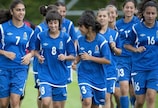Estonian hope for women's game
Tuesday, April 30, 2013
Article summary
Women's football in Estonia is on the rise thanks to dedicated work by the Estonian Football Association – and a conference in Tallinn highlighted the country's goals for the future.
Article top media content

Article body
The Estonian Football Association (EJL) held its first major women's football conference last week, supported by UEFA.
Local women's football experts took the platform at the forum in Tallinn to speak about their recent achievements and goals for the future, while Sheila Begbie of the Scottish Football Association (SFA) presented her country's example as a useful guide.
Women's football remains a very young sport in Estonia where the first women's teams originated in the early 1990s. Since last year, however, the female game can count on its own committee within the EJL, and 15 clubs compete in the top two divisions of the Estonian women's league. With female futsal and grassroots championships also established from 2012, the future of the sport is bright.
"We lost 12-0 to Iceland and France in my first matches as women's national team coach, but then we started to win against strong opponents," said Keith Boanas, who moved from England to Estonia in 2009. "We shouldn't go into any game thinking about losing. There was something of that mentality when I first came, but things have changed a lot since. The positives outweigh the negatives. We have been getting more and more players and coaches in recent years."
Anne Rei, the EJL general secretary and a member of the UEFA Women's Football Committee, called on her peers to continue this forward momentum for the women's game in the Baltic country. "Women's football development is one of our main aims for the next few years. Attitudes towards women's football are changing positively and rapidly in society and in clubs, who have started to treat women's football as a natural part of their infrastructure."
SFA head of girls and women's football Sheila Begbie gave an inspiring talk as one of the focal points of the conference. "We made great changes in the women's game in Scotland. For example, the women's team used to train twice a week, now they train five times. Now you can do many things in women's football. But it's not just up to Anne [Rei] and Keith [Boanas], the biggest difference is being made by you, the people sitting here. You are not in competition, you should work together and in close cooperation with the EJL and UEFA.
"But it's not only about football. Girls come to play because they want to be with friends, they want to have fun," Begbie said. "Develop clubs, develop people at clubs, develop coaches and give every girl the opportunity to play."
UEFA chief technical officer Ioan Lupescu, meanwhile, expressed his confidence in the women's football movement in Estonia when addressing the conference. "It's a privilege for me to be here with you, pioneers of women's football," he said. "UEFA's vision is to provide opportunities to play the game regardless of skill or talent. This is the message not only to member associations, but also to municipalities. Representation for your association on UEFA's Women's Football Committee will also give you fresh impetus. In Estonia only 10% of coaches are women, but you have great enthusiasm to develop this sector. I'm very confident you are on the right path. "
Citing the international development tournaments being staged by UEFA at Under-16 level for boys and girls this spring, Lupescu added: "The UEFA development tournaments are a very good thing for you to make further steps forward. We believe this is a crucial age to learn and to get to the elite level. It doesn't matter if you win or not. The main thing is to practise at a high level and also to exchange ideas between coaches and referee observers."
Keith Boanas, who is not only national team head coach, but also coordinates the entire women's football sector for the EJL, told delegates: "I want to emphasise that without UEFA support and funding, I couldn't come here. The tournament structures that UEFA provides are instrumental in developing women's football. Every girl gets an opportunity to play for national or youth teams. They can only gain from this. UEFA's efforts, workshops and tournaments are just priceless.
"We've already got our first female UEFA Pro licence coach [Katrin Kaarna], which is a great achievement for us. By 2017 we want a second one. By the same year we are going to have between 1,300 and 1,700 women and girls in competitive and recreational leagues. We also have a target of having 20 to 30 women's referees to be able to cover all female competitions, plus to qualify for UEFA tournaments."








